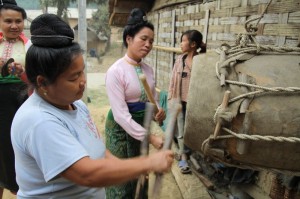Project Phongsali: One village festival ends, another begins. All groups view the coming rainy season as a time of renewal.

Tai Dam women have the responsibility to beat the ceremonial drum that calls villagers to the annual festival. The drumming continues throughout the day and most of the night.
Day 67
Last night the Tai Dam people in Sop Houn village began their annual festival, right on the heels of the enthusiastic Tai Deng celebration that consumed all of last weekend and spilled into the early part of this week. Interestingly, while the Tai Deng residents partied loud and hard, the Tai Dam people resisted temptation, ignored the raucous activity, and held to their normal routine.
When I inquired about the lack of Tai Dam participation, my Tai Deng sources insisted that no ethnic group in the village was intentionally excluded; my friends insisted that while the Lao Loum, Tai Dam, Khamu and other ethnic groups are always invited but inevitably beg off probably to avoid sharing the cost of food and drink. Everyone predicted that this week, in turn, the Tai Deng residents would likely decline invitation to the Tai Dam fest.
The conspicuous exceptions to this voluntary segregation were the teenagers from diverse ethnic groups who crossed over and attended the Tai Deng festival out of youthful enthusiasm for drink, music and courtship.
As darkness fell last evening a Tai Dam woman, decked out in her finest clothes, began beating a huge animal skin drum that she and her friends had suspended that from a tree branch in the center of the village. Her steady, simple rhythm heralded the start of festivities and called all villagers to the opening celebration. Soon, down every footpath in the village, villagers were strolling toward the drum.
Yai and I grabbed our flashlights and followed the sound: ba-boom-boom-ba, ba-boom-boom-ba, ba-boom-boom-ba, to a house in the center of the village where young mothers with infants in arm were congregating. Given the absence of children out of infancy I guessed that the call heralded all the mothers who have given birth since the last festival. Inside the house twenty or more mothers proudly bounced, rocked, nursed or cradled their babies.
Dim lighting inside the house limited photography, but the greater challenge was the likelihood that my presence among so many infants would ignite a firestorm of wailing. This village has had so little contact with westerners most children here burst into tears when they first see my strange face peering at them. It’s the rare, exceptional baby who will laugh and boldly tug at my moustache. Most either cry or bury their face in mother’s neck. I decided that I’d just file images from this baby-show-and-tell in my memory bank and not alarm the infants with my an appearance uncommon among Lao men: pale skin, bald head, long nose and bushy moustache.
Throughout the evening and into the wee hours of the morning women took turns at the lone, ceremonial drum, maintaining a constant beat and rarely introducing a new rhythm. Then, before dawn today the drumming resumed. To my knowledge no male has touched the drum; hour after hour only women have borne the duty of steadily sounding the call.
After living in this village of only 520 people for over a month, I have come to recognize most residents by face or wardrobe. Since I’m seeing more people that I don’t recognize, I’m certain that the festival is drawing many people from the hinterlands. Perhaps the drumming is reaching villages upriver or along mountain trails. I also have a sense of increased motorbike traffic around the village, an indication that some people have traveled from distant towns and villages to join in the celebration.
